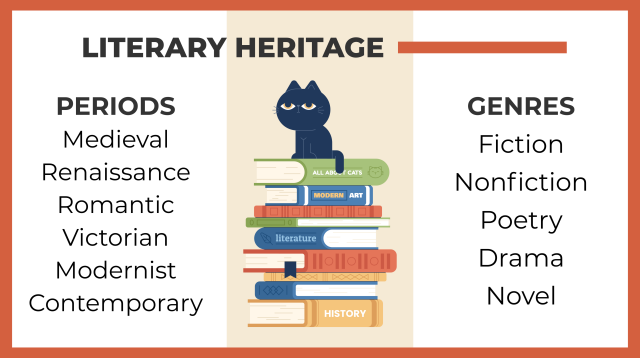
Previously, we explored the historical context and major literary periods in English literature. Now, let’s shift our focus to literary genres and understanding how they can help us interpret and appreciate different types of writing.
Introduction to Literary Genres
Literary genres are categories that classify written works based on their content, structure, and style. These genres provide a framework for understanding and analyzing various forms of literature. Here are some of the most common literary genres:
1. Fiction: This genre includes storytelling that is created from the author’s imagination. It can encompass a wide range of subgenres like mystery, romance, science fiction, fantasy, and more.
2. Poetry: Poetry is a form of artistic expression using structured language, meter, and rhythm to evoke emotions and convey ideas. Different forms of poetry include sonnets, haikus, and epics.
3. Drama: Drama involves the portrayal of characters and events through dialogue and performance. It includes subgenres like tragedy, comedy, and tragicomedy.
4. Non-Fiction: Non-fiction literature presents factual information or real events. Subgenres include autobiographies, biographies, essays, and journalism.
5. Mystery: Mystery novels typically involve a central enigma or puzzle that the characters work to solve.
6. Science Fiction: Science fiction explores speculative concepts and futuristic technology. It often raises questions about the impact of science and technology on society.
7. Fantasy: Fantasy literature creates imaginary worlds, often featuring magic and mythical creatures.
8. Romance: Romance novels revolve around themes of love and relationships. They can encompass historical romance, contemporary romance, and more.
Interpreting Literature through Genre Analysis
Now that we’ve introduced you to various literary genres, let’s discuss how to approach the interpretation of literary works. Here are some key steps to guide your analysis:
1. Understand the Genre: Recognize the genre of the work you’re analyzing. Different genres have unique conventions, themes, and structures.
2. Identify Themes: Themes are the central ideas or messages that a work conveys. Look for recurring themes or messages within the text.
3. Analyze Characters: Examine the characters’ development, motivations, and interactions. Consider how they contribute to the story’s themes.
4. Consider Setting: The setting of a story can significantly impact its meaning. Analyze the time and place in which the story unfolds.
5. Examine Style and Language: Pay attention to the author’s writing style, literary devices, and use of language. These elements can enhance the story’s impact.
6. Evaluate Symbolism: Many literary works use symbols and metaphors to convey deeper meanings. Identify and analyze these symbols.
Sample Analysis
To illustrate the process of literary interpretation, let’s analyze a short excerpt from Shakespeare’s tragedy, “Hamlet.” The play is a classic example of the drama genre, and it explores themes of revenge, madness, and moral dilemmas.
Excerpt: “To be or not to be, that is the question: Whether ’tis nobler in the mind to suffer The slings and arrows of outrageous fortune, Or to take arms against a sea of troubles And, by opposing, end them.”
Using the list above, here is a brief analysis of this, one of the most famous passages in all literature:
• Genre: This is a famous monologue from a tragedy, highlighting Hamlet’s internal struggle.
• Themes: The excerpt explores themes of life and death, existential questions, and the human condition.
• Character Analysis: Hamlet’s soliloquy reveals his contemplative and philosophical character.
• Language: Shakespeare’s use of metaphors and poetic language enhances the depth of the text.
• Symbolism: The phrases “to be” and “not to be” symbolize the choice between existence and non-existence.
Why is Literature Important?
The point here is simply that, by looking at different elements of literature, that process can help us to understand the work better and find the meaning within it.
Literature is often entertaining, but the entertainment is not the real reason we treasure these works.
An important reason we cherish these literary treasures from history is because they help reveal what’s meaningful and valuable in humanity and in our lives.
So, by learning how to find meaning in literature (about life), we just might be able to better find the meaning in our own lives. And don’t we all want to live a more meaningful life?
We are only briefly touching on these rich subjects and topics, which are explored more deeply in later English and Humanities courses.
Next, we will learn about another simple system for analyzing the meaning of all that we read.
